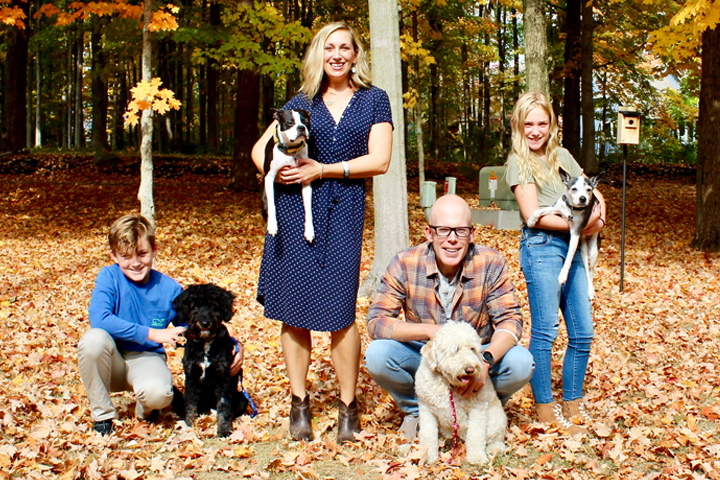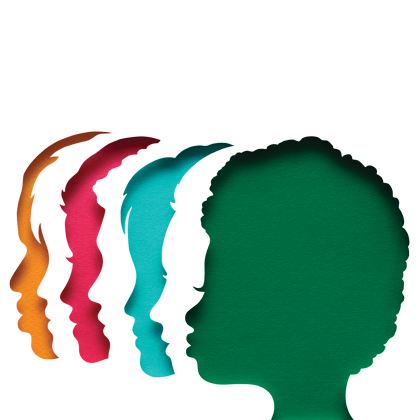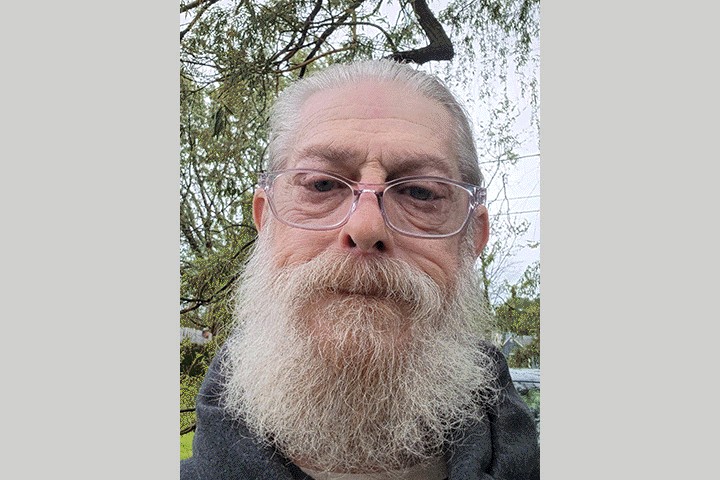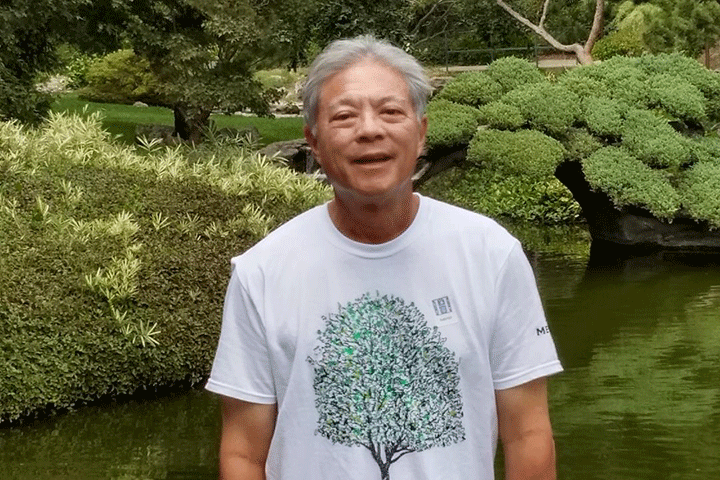Marching On Against Pancreatic Cancer

- Starting treatment with 5-FU
- A clinical trial at another hospital
- Major complication and surgery
- Chemotherapy with gemcitabine and Abraxane
In June 2019 I went to the hospital with what I thought was chest pains caused by anxiety.
I had numerous tests, including an ERCP, an awful probe that was sent down my throat and through all my organs. With the probe, doctors were able to scrape the tumor that had caused my gallbladder to stop draining and cause immense pain in my chest.
On June 10th, after four days in the hospital, including my daughter’s 9th birthday the day before, the doctor came in and gave Jen and I the news we knew was coming, although it was news no one is ever prepared for. The doctor walked in and said, “Your tumor is a ‘pancreatic adenocarcinoma.’”
Jen and I cried hard. I was more upset that I caused my daughter to have a bad birthday than anything and all I could think about was being there for the long haul for our kids. We both were sobbing. And scared. I remember telling her I’d be there to see Darby get married and I still stand by that goal today. I told a lot of friends and family that “today we can cry, but tomorrow we have to fight,” and I feel we’ve achieved that.
The next day I came home, tubes and drainage bags from my procedure attached to me. Jen and I sat down with the kids and shot them straight. Told them the truth. “Dad has cancer, dad needs a lot of help to fix this, but we are going to give it all we have. And we don’t know the future.” My kids didn’t really understand. We all cried. Hard.
Surgery First
I started treatment at St. Vincent’s in Indianapolis. I was scheduled for surgery with their surgeon, but it never felt right to my wife or myself. A very good friend of mine pushed me to get a second opinion from Dr. Christian (Max) Schmidt at the IU Simon Cancer Center (Indianapolis, Indiana), one of the top Whipple surgeons in the U.S. After we met with him we immediately canceled my surgery at St. Vincent’s and went with Dr. Schmidt and the IU team.
On July 1st I had a Whipple procedure with Dr. Schmidt. He has become a friend—he really prepped me and my family for what was coming. We have been very happy and comfortable with the decision ever since. There were a lot of complications and Dr. Schmidt and his team worked through them all. We feel lucky we made the switch; many days we felt a miracle happened at IU during my surgery. Within a few weeks I was back to walking and lifting and working and having a pretty normal life again.
Next, Chemo with 5-FU
My oncologist, Dr. Patrick Loehrer, started me on 5-FU. I had 12 treatments over 24 weeks. My chemo treatments were hard but I set up rules that I followed to help get through them. I lived by the basic thought of one day of treatment and 13 days to rebuild and get ready for the next one. 5-FU is an infusion that lasts around three hours. After each treatment I came home and tried not to nap. I learned early if you napped on Day 1, you’d want to nap again on Day 2, and Day 3, and so on. So instead I would walk, in outdoor malls, grocery stores, trails, nature centers, and our neighborhood. Fresh air and moving were key and always made me feel better.
I also focused on diet and eating. Each morning before treatment I would scarf down as many eggs as I could: three to five eggs and two pieces of toast. I think a full belly helped me tremendously in fighting the side effects. And on Day 2, no matter how bad I felt, I would force myself to eat again. I truly believe these two things helped me get through. By Day 3, with the help of my wife and kids, I was in the gym, walking, riding, running, and lifting trying to sweat that devil out.
A Clinical Trial
In March 2020 Dr. Loehrer found spots on my stomach. He recommended I join a clinical trial of RMC – 4630 and cobimetinib at Sarah Cannon Cancer Center, in Nashville, Tennessee. This trial was a whole new experience. One, I had to drive to Nashville from my home near Indianapolis, a 4.5 hour trip each way. With the craziness of COVID-19, I could not stop along the way or stay down there overnight, so many days I drove down and back in the same day. That was exhausting.
This trial was different, 21 days on medication and seven days off. It trashed my stomach, but I ate through it and continued to be as active as possible. It all seemed to work for a while, until the uncontrollable happened. I was not feeling well for the entire month of June and after about 12 days of not eating, I had a scan. We found the cancer progressed and my stomach closed off, causing me to be the sickest ever in my life. I had to have surgery to open my stomach and I was done with my clinical trial.
People ask if the trial was worth it and I always answer a resounding yes. There was a spot in my liver that seems to have disappeared, so if we got nothing more out of it, that happened and hopefully I helped people in the future.
One thing I did learn, is if you think something is not right, make sure you are fully open with your docs. Chemo causes craziness in your body, but listen to your body, because too much of a bad thing is not good.
Back on Chemo
I started treatment again at IU Cancer Center with gemcitabine (Gemzar) and Abraxane. Dr. Loehrer said “this should not have many side effects”—famous last words. Over the last 12 weeks I have taken this combo. The first few treatments were quite easy, but as the chemo built up, things changed. Random sickness, crazy stomach issues, the reappearance of neuropathy, cold feelings, it all comes on. But if I have learned anything, it is to stay distracted, keep working, keep living, and keep going forward. If you do, it’s all not that bad, and always remember you are fighting a bigger fight.
Over the past 12 weeks, I have rebuilt from being as low as I have been. I lost 30 pounds when my stomach shut. Through it all we have found a balance and beautiful life again. We surf as a family behind our boat—which drives my mom nuts—we hike, we walk, and some nights we just chill. Keeping your mind off the side effects and focused on how great life is goes a long way.
My last scan showed all of that has cleared up with the Gemzar/Abraxane combination. My scan this month (December) was good, and I feel the best I have felt since I got sick last June.
Moving Forward
Today we march on. We are all tired. I can’t feel my feet, my fingers tingle, my hair is gone, I am down over 70 pounds, every day I wake up and try to keep my weight steady, my stomach issues are nothing I’d ever discuss, but are outrageous. Through my surgery and 10-week recovery, to the devil of 12 5-FU chemo treatments, to my three 28-day cycles of the clinical trial with 12 nine-hour round trips to Nashville, and now nine treatments of Gemzar/Abraxane, it’s been quite the 18 months, but somehow I feel we are winning. Over the last month we got some good news, and we are beginning to feel it’s all worth it.
I hate saying cancer sucks. I hate hearing people tear it down. It is gawd awful, but it is a part of life. People fighting cancer need hope, every single day. The people I have met through this journey all have the same goal in helping change the outlook of this disease. From St. Vincent’s, to the IU Cancer Center, and to Sarah Cannon in Nashville, and now back to IU Cancer Center, I have learned that despite trillions of dollars of research, pancreatic cancer is still a relatively unknown disease. Most hope is given through dosing the body with chemotherapy and radiation in a hope to kill the cells. Filling your body with a poison in hopes that poison can kill the other poison. It can weigh you down in bad ways. That poison can make your body do things that you’d never imagine possible and not in good ways.
Jen and I could have taken the cancer sucks route. But we chose different things. This last 18 months we have shown that if you lead with love, a lot of great things can happen. My wife and kids have been my biggest cheering section as we have battled through this. The kids still cry and they still don’t understand. They both have been forced to mature faster than most. They have handled it incredibly well.
I think our family life is close to as fun as it was before I got sick. And I can never thank enough all the family, friends, docs, nurses, and others that have been part of this journey.
After two years battling pancreatic cancer, Chad passed away. He was willing to travel to try a clinical trial and gave everything to his family. We offer our deepest sympathy.






